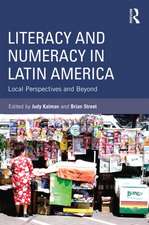English as a Global Language in China: Deconstructing the Ideological Discourses of English in Language Education: English Language Education, cartea 2
Autor Lin Panen Limba Engleză Hardback – 10 noi 2014
| Toate formatele și edițiile | Preț | Express |
|---|---|---|
| Paperback (1) | 382.75 lei 43-57 zile | |
| Springer International Publishing – 10 sep 2016 | 382.75 lei 43-57 zile | |
| Hardback (1) | 390.08 lei 43-57 zile | |
| Springer International Publishing – 10 noi 2014 | 390.08 lei 43-57 zile |
Din seria English Language Education
- 15%
 Preț: 643.84 lei
Preț: 643.84 lei - 18%
 Preț: 782.72 lei
Preț: 782.72 lei - 24%
 Preț: 846.66 lei
Preț: 846.66 lei - 24%
 Preț: 792.36 lei
Preț: 792.36 lei - 18%
 Preț: 1012.84 lei
Preț: 1012.84 lei - 18%
 Preț: 1008.12 lei
Preț: 1008.12 lei - 18%
 Preț: 1240.16 lei
Preț: 1240.16 lei - 20%
 Preț: 569.54 lei
Preț: 569.54 lei - 15%
 Preț: 643.00 lei
Preț: 643.00 lei - 18%
 Preț: 953.65 lei
Preț: 953.65 lei - 15%
 Preț: 589.02 lei
Preț: 589.02 lei - 15%
 Preț: 648.74 lei
Preț: 648.74 lei - 18%
 Preț: 1119.24 lei
Preț: 1119.24 lei - 18%
 Preț: 1116.57 lei
Preț: 1116.57 lei - 18%
 Preț: 727.00 lei
Preț: 727.00 lei - 18%
 Preț: 777.20 lei
Preț: 777.20 lei - 15%
 Preț: 636.30 lei
Preț: 636.30 lei - 18%
 Preț: 1115.63 lei
Preț: 1115.63 lei - 18%
 Preț: 894.79 lei
Preț: 894.79 lei - 15%
 Preț: 637.28 lei
Preț: 637.28 lei - 18%
 Preț: 941.68 lei
Preț: 941.68 lei - 18%
 Preț: 724.17 lei
Preț: 724.17 lei - 18%
 Preț: 886.62 lei
Preț: 886.62 lei - 18%
 Preț: 885.63 lei
Preț: 885.63 lei - 18%
 Preț: 721.19 lei
Preț: 721.19 lei -
 Preț: 391.79 lei
Preț: 391.79 lei - 18%
 Preț: 784.48 lei
Preț: 784.48 lei -
 Preț: 389.31 lei
Preț: 389.31 lei - 18%
 Preț: 1115.28 lei
Preț: 1115.28 lei
Preț: 390.08 lei
Nou
Puncte Express: 585
Preț estimativ în valută:
74.64€ • 78.14$ • 61.76£
74.64€ • 78.14$ • 61.76£
Carte tipărită la comandă
Livrare economică 07-21 aprilie
Preluare comenzi: 021 569.72.76
Specificații
ISBN-13: 9783319103914
ISBN-10: 3319103911
Pagini: 189
Ilustrații: XIII, 189 p. 5 illus.
Dimensiuni: 155 x 235 x 18 mm
Greutate: 0.46 kg
Ediția:2015
Editura: Springer International Publishing
Colecția Springer
Seria English Language Education
Locul publicării:Cham, Switzerland
ISBN-10: 3319103911
Pagini: 189
Ilustrații: XIII, 189 p. 5 illus.
Dimensiuni: 155 x 235 x 18 mm
Greutate: 0.46 kg
Ediția:2015
Editura: Springer International Publishing
Colecția Springer
Seria English Language Education
Locul publicării:Cham, Switzerland
Public țintă
ResearchCuprins
Chapter 1: Language Education in China: the Cult of English.- Chapter 2: Globalization: an Economic and Cultural Perspective.- Chapter 3: Ideologies in English Language Education: A Synchronic and Diachronic Approach.- Chapter 4: State Ideologies of English Education in China: Revisiting the History.- Chapter 5: English Language Ideologies in Chinese Foreign Language Education Policies.- Chapter 6: English Language Ideologies Reflected in Teachers’ and Students’ Discourse.- Chapter 7: English Language Ideologies in Olympic Beijing.- Chapter 8: Ideologies in Language Education in China: Past, Present and the Future.- Appendix A.- Appendix B.- Appendix C.
Recenzii
“The scope and depth this book achieves in deconstructing the ideological discourses of English in China make its contribution particularly valuable. For researchers, policy makers, and language educators who want to understand English education beyond classroom practices, this is the book. Given the rise of China in the globalising arena, insights gained from China's appropriations of English in this book also have significant implications for the understanding of English development in global contexts.” (Weihong Wang, System, Issue 53, 2015)
Textul de pe ultima copertă
This book offers insight into the spread and impact of English language education in China within China’s broader educational, social, economic and political changes. The author's critical perspective informs readers on the connections between language education and political ideologies in the context of globalizing China. The discussion of the implications concerning language education is of interest for current and future language policy makers, language educators and learners.
Including both diachronic and synchronic accounts or China’s language education policy, this volume highlights how China as a modern nation-state has been seeking a more central position globally, and the role that English education and the promotion of such education played in that effort in recent decades.
Including both diachronic and synchronic accounts or China’s language education policy, this volume highlights how China as a modern nation-state has been seeking a more central position globally, and the role that English education and the promotion of such education played in that effort in recent decades.
Caracteristici
Offers insights on China’s English language education policies A critical perspective of ELT in China An economic and cultural perspective on globalization and the global spread of English










